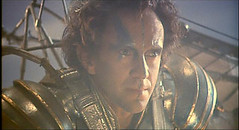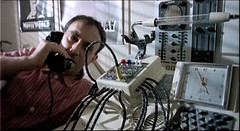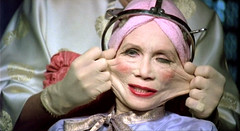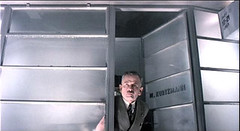Yesterday I got laid off from my day job at a tech company. This got me thinking about an unpublished essay I wrote a couple years ago about my relationship to the Terry Gilliam film Brazil. Here it is. –Ryan
Terry Gilliam’s Brazil
I woke in the theater to the sound of my own snoring. It was past midnight in the year 2000, and from the projection booth came a stream of light that struck the screen to form Brazil, the 1985 movie by Terry Gilliam. This was the Eqyptian Theater, down the street from my apartment in Seattle, half full of shadowy figures attending a midnight showing. Somewhere around the halfway mark I had fallen asleep, and woke again toward the film’s end with the snoring trick I’d taught myself in college lecture halls.  On screen, Sam Lowry, played by Jonathan Pryce, had infiltrated the Ministry of Information hoping to get closer to the truth behind the vast and cruel bureaucracy that keeps him from his dream of true love. Suddenly panicking that I had annoyed the rest of the audience with my honking, I slipped out the exit and into the night. I didn’t need to see how the movie turned out; I had watched it before, many times, on video when I was in high school and college, and on the Criterion Collection DVD boxed set, a recent splurge purchase. More than that, though, I had begun to live in it.
On screen, Sam Lowry, played by Jonathan Pryce, had infiltrated the Ministry of Information hoping to get closer to the truth behind the vast and cruel bureaucracy that keeps him from his dream of true love. Suddenly panicking that I had annoyed the rest of the audience with my honking, I slipped out the exit and into the night. I didn’t need to see how the movie turned out; I had watched it before, many times, on video when I was in high school and college, and on the Criterion Collection DVD boxed set, a recent splurge purchase. More than that, though, I had begun to live in it.
I was introduced to Brazil when I was 12 through Starlog, a science fiction magazine I occasionally picked up at the grocery store. Amid articles on the newest products of the Star Trek franchise were stills from Gilliam’s film, which looked nothing like my definition of scifi. In one, Jonathan Pryce appeared to be humping a desk. In another, in the guise of a metallic angel, he battled a gigantic samurai. I sought the movie in my hometown at Video Depot, locating the tape amid the perplexing Emmanuelle titles in the “Foreign” section. I remember mostly a surface amusement of the film on my first viewing. The woman whose face turns to a pliable putty, the strange workers who get bent out of shape about something as silly as duct repair. Brazil appeared to take place both in the future and some strange parallel version of the 1950s. I believe I fell asleep watching it the first time, too.
A few years later, in high school, I was lucky to fall under the influence of a history and philosophy teacher named Dave Cornelius, a Vietnam veteran who also owned Easton’s Books, my home town’s used bookstore. Dave had a poster of Brazil on the wall behind his desk, next to a poster of Bob Dylan. He had a reputation for being the most intellectual teacher at Mount Vernon High, a guy who somehow got away with occasionally dropping the f-word in class. In between history assignments I gave him some of my shitty poems, hoping for feedback. One afternoon he called me to his desk at the end of class.
“You don’t belong in high school,” he said, “You belong in a cafe in San Francisco, smoking pot and talking about poetry.”
My education commenced. I traded my Stephen King hardbacks at Easton’s for City Lights chapbooks and Jerzy Kozinski novels. On Sundays, when the store was officially closed but when Dave did much of his restocking and shelving, I dropped by for coffee and long conversations. While serving in Vietnam, Dave had kept himself sane with Dylan and regular shipments of classic literature sent by a group of women from a church somewhere stateside.  He’d read all of Dostoevsky while overseas, and had developed a love for philosophy, particularly Heidegger and Kierkegaard. After I read The Metamorphosis I told him how much I loved Kafka. Dave ripped into me. “Don’t read The Metamorphosis and tell me you love Kafka. You don’t have a right to say you love Kafka after reading one novella. Read ‘In the Penal Colony.’ Read The Trial. Read The Castle. Then tell me what you think about Kafka.”
He’d read all of Dostoevsky while overseas, and had developed a love for philosophy, particularly Heidegger and Kierkegaard. After I read The Metamorphosis I told him how much I loved Kafka. Dave ripped into me. “Don’t read The Metamorphosis and tell me you love Kafka. You don’t have a right to say you love Kafka after reading one novella. Read ‘In the Penal Colony.’ Read The Trial. Read The Castle. Then tell me what you think about Kafka.”
I was a slightly above average student who never took the coursework too seriously. In Dave’s classes he and I had an unspoken understanding that the assignments were beside the point and that we’d pursue a curriculum based on our own mutual interests. Having become accustomed to blanket praise from my English teachers, I was shocked and provoked when he called bullshit on some of my stories and poems. But I’d never had a champion like Dave Cornelius, who, after my poem about a masturbating George H.W. Bush made it into Xeroxed punk fanzine from Brooklyn, yelled down the hall, “Hey, there’s a published writer!”
Dave’s enthusiasm for Brazil intrigued me. He claimed as his favorite movie. I’m sure spending twenty years in the Mount Vernon School District had given him some hard experience in bureaucratic absurdity, and I imagine his mind had at times felt stultified in the faculty lounge. In his bookstore full of Hegel, Babel, Schulz, and Leibniz, my mentor was a Sam Lowry, too.
***
The Evergreen State College, in the throes of the grunge years. I lived in a six-man apartment on campus, with a communal kitchen, one of the worst architectural blunders a college can make. Get half a dozen twenty year-old guys in an apartment with a kitchen and it will soon be transformed into a bio-weapons lab. Here’s an experiment: take a beer bottle with an inch of beer left in it and leave on the counter for a month. Quickly, the beer will attract fruit flies, who will imbibe, pass out, and die in the bottle. Over time there forms a thick, black layer of fruit fly corpse scum.  Or consider a loaf of bread in a plastic bag. Did you realize that this household item can actually generate heat? Just let it turn entirely to mold, then observe as it composts. Quick Tip: Using Elmer’s Glue to adhere beer bottle labels to the refrigerator door for your “art project” is not as sensible as using rubber cement, which doesn’t ruin the enamel when you attempt to peel the labels off at the end of the year, hoping to earn back your damage deposit. Here’s a household suggestion for those who can’t afford a white board and dry erase marker. Just use cooked spaghetti instead and apply it directly to the wall. Spell out messages to your friends. For instance: Fuck You.
Or consider a loaf of bread in a plastic bag. Did you realize that this household item can actually generate heat? Just let it turn entirely to mold, then observe as it composts. Quick Tip: Using Elmer’s Glue to adhere beer bottle labels to the refrigerator door for your “art project” is not as sensible as using rubber cement, which doesn’t ruin the enamel when you attempt to peel the labels off at the end of the year, hoping to earn back your damage deposit. Here’s a household suggestion for those who can’t afford a white board and dry erase marker. Just use cooked spaghetti instead and apply it directly to the wall. Spell out messages to your friends. For instance: Fuck You.
The TV set in our apartment was tiny and occupied one of the chairs we would have sat in had we behaved like those students in the college catalog. Instead, sitting and gathering for a communal event like watching a movie involved moving piles of shit–like the industrial fan one of us stole from a Taco Bell construction site–from one part of the room to the other. One of us popped in Brazil and we waded into deconstructionist battle, armed with poststructuralist hoo-hah. It was obvious to anyone with a pulse that the world we lived in was controlled by One Gigantic Corporation. Everyone knew that, from our faculty to the guy I met who chose to litter because Dumpsters were “too corporate.” Fact: capitalism was a way to enslave human beings, make them utterly boring, deny their natural Dionysian drives toward polyamory and chemical experimentation with consciousness, and oppress them with received gender roles and narrowly defined beauty. If only the straight world would listen to us, we who were enlightened on how to live! I started to see elements of Brazil that I had missed before. As a pre-teen I had simply dug it as weird; now I understood it to be a biting social satire, an indictment against selfishness, narcisism, and the blind pursuit of material wealth, a jeremiad against those who would prevent us from following our bliss.
Just then someone came home with a life-size papier-mâché donkey stolen from a nativity scene. Setting it on fire and throwing it from a balcony was one of the more reasonable ideas floated. I’m compelled to come clean that our apartment was full of stolen goods, but want to make it clear that very few of them had been stolen by me personally. I take no responsibility for the two life-sized fiberglass statues of Ronald McDonald. Or the plaster statue of Michelangelo’s David. The gigantic conference room table was not my idea, either. I did assist with the two 75-pound bags of potting soil. These thefts had nothing to do with procuring goods for use or sale, rather they were our juvenile way of spitting in the eye of our corporate oppressors. Okay, no. We weren’t thinking that deeply. We just thought having a statue of Ronald McDonald would be awesome. Meanwhile, in the world of Brazil, the matrons of commerce obliviously continue their lunch as terrorist bombs explode around them.
***
Brazil was one of the first DVDs I ever purchased, with bonus money from my job as a Customer Service Rep at Amazon.com.  I had manned the phones and email during the launch of the music store and now the video/DVD store. In the winter of 1998 I noticed that many customers were calling to ask about DVDs, and I came to understand that the Criterion Collection was considered the standard by which all DVDs were measured. When I heard that Brazil was to be released in a three-disc set, I knew I had to have it.
I had manned the phones and email during the launch of the music store and now the video/DVD store. In the winter of 1998 I noticed that many customers were calling to ask about DVDs, and I came to understand that the Criterion Collection was considered the standard by which all DVDs were measured. When I heard that Brazil was to be released in a three-disc set, I knew I had to have it.
My first stint at Amazon lasted two years, during which I did everything I could to escape Customer Service and join the Editorial team. When a number of editors were laid off, I realized my editorial career wasn’t going to happen at Earth’s Biggest Bookstore and applied for a position at Drugstore.com, where my wife had begun to work her way up from Customer Service herself. Like Sam Lowry applying for the position that would give him access to secret files about the girl of his dreams, I left a place of relative comfort and camaraderie to join a company on the brink of the implosion of the dotcom bubble, in vague hope that it would advance my editorial career.
Drugstore.com’s offices occupied an office park off Interstate 90 in a suburb of Seattle named Factoria, as in utopia crossed with a factory.
My position, Email Communications Editor, had not existed before I went to work on a team of editors who hid in their cubes as if they were bunkers on the battlefront of some hideous, endless military operation. Within a month, everyone who had interviewed me had left the company. Somebody dumped a pile of VB-Script code in my inbox and told me to fix the auto email system. I commuted with my wife, who had a 5 AM phone shift, and ate the cereal provided as a perk while downloading music from Napster and writing product recall emails that were urgent-sounding without being too alarming. The CEO, Kal Raman, a man whose personality had been forged in the economies of India and Wal-Mart, showed up at an editorial meeting to raise an interesting question, “Why do we even need editors when we have Spell-Check?”
Every few months during my short time at Drugstore.com, a number of employees were hooded, tossed into the backs of trucks, and driven to a remote quarry in the Cascades, where they were lined up, forced to kneel, and shot, falling backward into a conveniently-dug mass grave. That’s how it felt at the time, anyway. Soon after one of these layoffs, the managers who’d done the laying off would realize that they’d just let go of someone who was the only person who knew how a particular system worked. So new people would get hired, into newly created positions, provoking a series of turf battles among the existing employees. After a layoff the executive team would pull the remaining employees together in a conference room and try to convince us we shouldn’t flee screaming. One time this involved both Kal Raman’s recitation of passages from the Upanishads and super-investor John Doerr giving us a pep talk about why we shouldn’t worry so much about profitability and the tanking stock price.
By the way, did I mention we also got free soda and Snapple? That was great!
 After my boss split, a new boss was hired to replace him, a guy I’ll call Nick. Nick had spent his career writing and editing advertising copy as a contractor for a number of Seattle businesses, and was now ready to join the 9-to-5 working world. He called me into his office a few weeks after he started and said he needed 25 words on a new product called Always Feminine Wipes.
After my boss split, a new boss was hired to replace him, a guy I’ll call Nick. Nick had spent his career writing and editing advertising copy as a contractor for a number of Seattle businesses, and was now ready to join the 9-to-5 working world. He called me into his office a few weeks after he started and said he needed 25 words on a new product called Always Feminine Wipes.
“But you have to be coy about it,” he said, “You can’t use the words ‘pussy’ or ‘stink’.”
“How about the word ‘odor’?”
“I don’t think so.”
“Can I use the word ‘moist’?” I said.
“That may be pushing it.”
“What about ‘fresh’?”
“No, that would imply they’d use these things because they are not ‘fresh.'”
“Can I use ‘clean’?”
“Absolutely not. We don’t want to convey that their pussies are unclean.”
“How about ‘revitalizing’?”
“That’s getting closer, but we use that word too much in relation to shampoo around here.”
Later, since all decisions relating to editorial copy five words or longer had to be signed off by ten people, we sat in the Prozac Conference Room and discussed my copy that was absolutely not about a woman’s need to freshen her malodorous cunt. Once we were happy with those 25 words, we discussed our strategy for communicating Drugstore.com’s new “Sexual Well-Being” store. Vibrators, basically.
“How about this,” Nick said, “‘Relax the muscles and get rid of some of that pent-up tension.'”
One guy with a title I didn’t understand raised his hand. “Not to get off-topic here, but how come we don’t sell anything anal?”
Not only did Nick hope to assist customers with finding ways to release their pent-up tension, he was keen on helping our female co-workers do the same. A humanitarian of sorts, he hoped to do this by offering them rides on the back of his motorcycle. One of the women I worked with who must have seemed particularly tense to Nick was a nineteen year-old intern who, whenever passing Nick in the hall, provoked in him a facial expression similar to that of someone who has just bitten down on a lemon wedge.
“So I’m going home to Chicago this weekend to see my mom,” Nick said to me one day during an enforced food-related morale event, “And she has this friend who has a daughter they want to set me up with. All cool, right? So I’m wondering if I should be a gentleman, take this young lady out to a nice dinner, take in a movie, drop her off at home, say goodnight, etc, or if I should just take her straight home and fuck the shit out of her.”
I wrote about toe fungus. I wrote the words “Fresh breath will make her linger longer.” I wrote safety warnings about bath toys. I wrote about Viagra. I wrote “Looking for a nifty gifty?” I wrote about the absorption potential of adult diapers. I thought about writing a novel but couldn’t pull myself together enough to start it. My years as a graduate student honing my fiction were receding behind me as I suffered through a writer’s block that left me feeling forsaken by the muses. I was being punished for taking an email about baby bottle nipples through twenty drafts. I wrote about Q-Tips. 25 words.  Or I wrote about the convenience of ordering your Band-Aids online. I entered editorial review meetings in which these upbeat chunks of copy were pulled apart like Thanksgiving turkey by the former sorority sisters responsible for the “customer experience.” Since “words” were part of what customers “experienced,” my words were a source of constant deliberation. That these deliberations involved the best ways to communicate the softness of toilet paper humiliated me. I was feeling more like Sam Lowry every day.
Or I wrote about the convenience of ordering your Band-Aids online. I entered editorial review meetings in which these upbeat chunks of copy were pulled apart like Thanksgiving turkey by the former sorority sisters responsible for the “customer experience.” Since “words” were part of what customers “experienced,” my words were a source of constant deliberation. That these deliberations involved the best ways to communicate the softness of toilet paper humiliated me. I was feeling more like Sam Lowry every day.
Lowry’s only refuge is his dreams, and when he attempts to pursue his dreams in reality the system in which he lives refuses to tolerate it. Gilliam created a great parable about artistic creation, all the more meaningful considering the struggles he endured to make his vision reach the screen intact. The Criterion edition of the DVD includes two cuts of the film–Gilliam’s cut, and the “Love Conquers All” version in which things end happily ever after for Sam and his ethereal lady friend. Pressured by Universal Studios to leave audiences with an upbeat ending, Gilliam recapitulated Sam’s increasingly disruptive methods by surreptitiously screening his cut of the film to the Los Angeles Film Critics association prior to its theatrical release, resulting in their naming it the best film of the year. When the studio still balked, Gilliam took out a full-page ad in Variety addressed to Universal exec Sid Sheinberg asking why they weren’t releasing his movie as he had created it. Driven to the desperate measure of publicly shaming his opponents, it’s not hard to imagine Gilliam as Lowry, defiantly clutching a mannequin arm as a weapon, squaring off against the gigantic samurai of Hollywood, fighting for his creative vision.
Walking home from Brazil in the early hours of a Saturday, after a week of writing copy about apricot body scrub, I came to understand that a story I had once thought was simply weird, then biting satire, was now one with which I identified completely. The movie had stayed the same over 15 years, but I had changed, and each time I watched Brazil it kept pace with who I was becoming until I found myself a dotcom version of its protagonist, trying to rally the courage to fight for my creative freedom.
One way I attempted to obtain my freedom was by applying for a residency at Yaddo, where I hoped to start my novel. In fall 2000 I submitted my paperwork and writing sample. Weeks later my wife and I were on our way to a Mariners game in which the team had a chance to make it to the playoffs. On the way out I stopped by our mailbox and found the acceptance letter from Yaddo. That night the Mariners made it to the playoffs and I started putting together a list of things I’d need to bring with me to Saratoga Springs. At work the following Monday I didn’t make much effort to mask my ebullience and word quickly spread among the editors that I had gotten invited to this somewhat prestigious artist colony. A few weeks later I lost my job.
 This particular layoff was bungled from the start. After previous layoffs Drugstore.com had hired a woman who specialized in post-layoff counseling for remaining employees. She had led sessions where employees wrote angry things on big pieces of butcher paper taped to conference room walls. When I saw this “layoff lady” struggling with the espresso machine in the kitchen one morning I knew we were doomed. Word was we would all get invited to one of two meetings, one at ten o’clock, the other at eleven. As soon as the meeting request popped into my Outlook, my wife called me from her office across the campus.
This particular layoff was bungled from the start. After previous layoffs Drugstore.com had hired a woman who specialized in post-layoff counseling for remaining employees. She had led sessions where employees wrote angry things on big pieces of butcher paper taped to conference room walls. When I saw this “layoff lady” struggling with the espresso machine in the kitchen one morning I knew we were doomed. Word was we would all get invited to one of two meetings, one at ten o’clock, the other at eleven. As soon as the meeting request popped into my Outlook, my wife called me from her office across the campus.
“Which meeting did you get?” she said.
“The ten o’clock.” I said, “What about you?”
“The eleven.”
I shuffled into the meeting room and allowed them to place the hood over my head.
Nick, naturally, kept his job.





